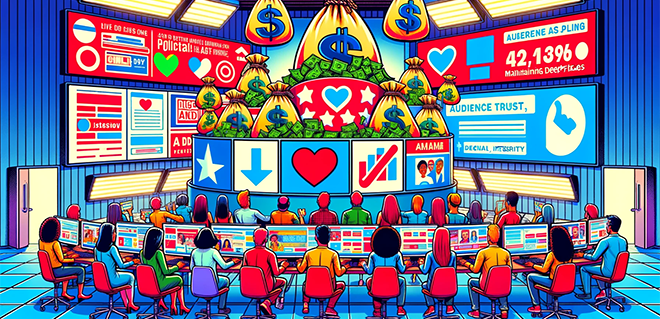
This January 15, people across Iowa will gather to caucus, officially kicking off the 2024 election cycle. Political campaigns and PACs are expected to pour $10 billion into political ads in an attempt to sway voter behavior. Much of that will be spent online.
We already see troubling issues on the horizon — generative AI, deepfakes, fraud, a highly polarized electorate, distrust of media — and that publishers will need to consider and address.
Generative AI & Election Ads
Election experts are deeply concerned about the potential of generative AI to spread advertising disinformation, with some calling it a “political super-weapon.” This isn’t an idle fear, as generative AI has already been deployed in political campaigns, such as an ad released by a super PAC associated with Ron DeSantis that featured AI-generated images of Trump and Dr. Anthony Fauci.
As GeoEdge CEO Amnon Siev, warns “Publishers’ credibility is on the line as they are judged on their capacity to filter out AI advertising disinformation.”
Malware, Malvertising & Scams
Fraudsters are quick to latch onto any trending topic if it means that users will click on their ads, and elections are no exception. In 2016, Facebook allowed political ads that were actually scams and malware. Over the next 12 months, publishers should expect similar scams to appear on their sites, GeoEdge experts warn.
Bait-and-switch tactics are another tactic, luring consumers onto a landing page that contains malware or a social engineering scheme (i.e. scams used by criminals to exploit a person’s trust in order to obtain money directly or obtain confidential information to enable a subsequent crime). Consumers blame publishers when a scam originates from their sites.
Impact of Political Ads on the Publisher’s Reputation
Political ads have an impact on the reader, whether they support the candidate or party advertisers or not. In our highly-charged political environment, all publishers should revisit their policy towards political ads to ensure they’re not sending an unintended message to readers.
For instance, all readers have expectations regarding political ads and online publications. Some readers want specific publications to be free of political ads, as politics isn’t endemic or relevant to the content of those sites.
Other readers expect to see political ads in some publications but have expectations as to what those ads advocate. Readers of left and right-leaning sites will expect to see very different types of ads. Additionally, expectations can differ within a general news site, with readers finding political ads within the business or politics section, but not the cooking or real estate pages.
Another consideration is unintended bias. Political advertising can lead to perceived bias and reduced credibility of online news stories. This loss of credibility is particularly acute when stories are critical of the reader’s preferred candidate or political party, and has become a significant issue over the past six years when political leaders began referring to the press as “the enemy of the people.”
While broadcasters are barred from refusing any political ads, online publishers have more leeway as to the ads they can accept. Publishers that want to avoid perceptions of bias may want to establish rules for political ad suitability in conjunction with political content.
Finally, there are vulnerabilities within programmatic advertising.
AdMonsters research conducted earlier this year shows that users are quick to leave a site or app if they encounter a bad ad, which we defined as an ad that is, “unpleasant, inappropriate, untruthful, or has some kind of computer virus associated with it.” For this reason, it is critically important that publishers implement tools that can enforce brand safety and brand suitability measures.
Bad actors often slip past brand suitability measures by presenting an ad that is acceptable, but leads the user to a landing page that has offensive political content, or a scam.
An ad may pass through an SSP and multiple malware screens because its code is clean. But many legitimate-looking ads lure consumers to landing pages that make unrealistic promises, trick users into disclosing the credentials to their financial institutions, or some other scam.
Developing A Political Ads Strategy
There’s no universal strategy that’s appropriate to every online publication. Some editorial teams may choose to ban all advertisements related to elections, while others may opt to accept ads from any campaign, political action committee (PAC), or candidate. Unlike traditional broadcasters, radio stations, and print media, online publishers have the flexibility to selectively accept political ads from certain candidates, PACs, or political parties while declining others.
Working in conjunction with GeoEdge, AdMonsters has created a Political Ads Playbook for publishers, which outlines the framework for an ad quality strategy. It also explores the tools at publishers’ disposal, offering insights into the challenges they may encounter during the upcoming election cycle.
Download the Political Ads Playbook today to get valuable insights, strategies, and tools to safeguard your ad quality, user safety, and reputation.